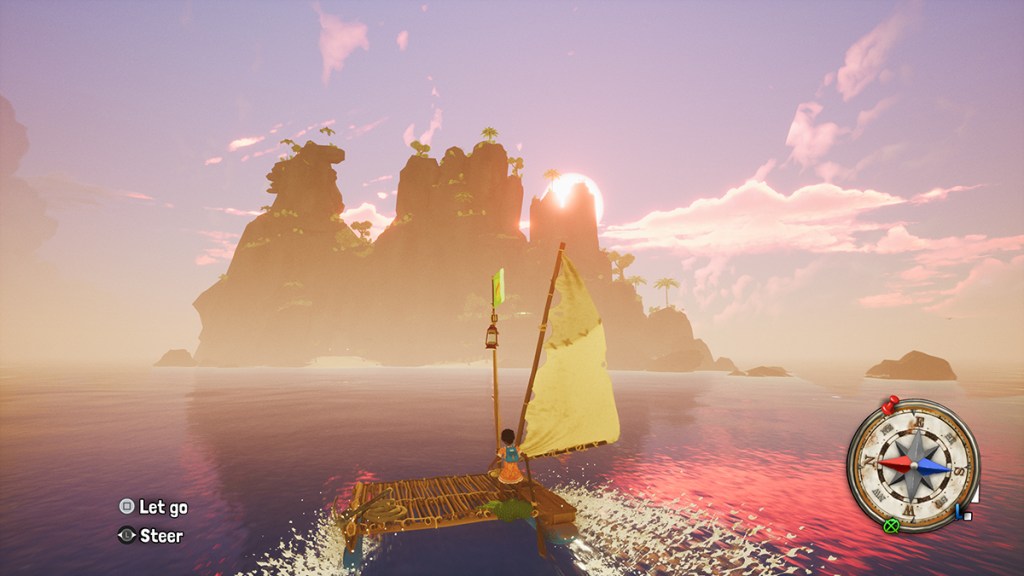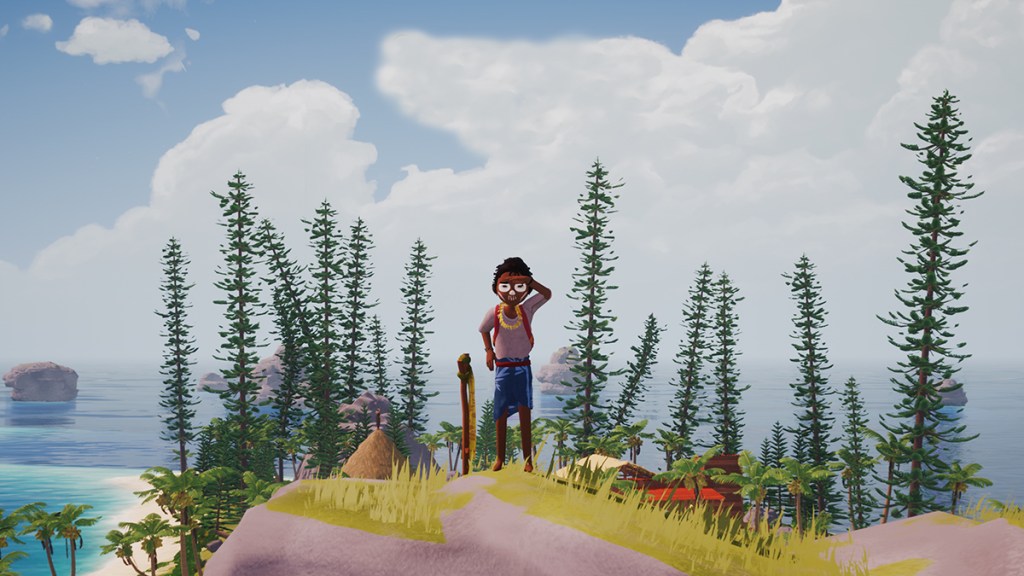Video games can offer players glimpses into other cultures, but so many of them choose the same ones. Assassin’s Creed is a decent example of this since, even though it has visited places like Egypt and Damascus, most entries focus on European points of views in European cultures. Tchia takes place far away from Europe and on a few islands inspired by New Caledonia, which is off the coast of Australia. Even with a culturally unique setting and cutesy visual style, its shallow gameplay is entirely too familiar and repetitive to make for a worthy digital vacation.
It’s an odd disconnect because Tchia is clearly inspired by two The Legend of Zelda games — Wind Waker and Breath of the Wild — that have had a lasting impact because of their one-of-a-kind presentations. The vibrant, simplified art style and nautical sailing recall Link’s boat-fairing journey, while the glider and upgradeable stamina meter are reminiscent of the tunic-wearing warrior’s Switch debut.

Tchia controls well and looks decent enough, but the rest of the game that surrounds those elements is rather hollow. Its open world is filled with things to do, yet almost all of them are extremely simplistic and the most basic form of checklist design that has gotten increasingly stale over the years. There are stamina-raising fruits and trinkets littered around that just require the player to simply walk up and take them; there’s no challenge whatsoever. Open worlds need to have items to collect, but they become filler when presented so plainly and at such a staggering number.
These little fruits and doodads that are exhaustively sprinkled across the map make up the vast majority of Tchia’s open-world activities, but the rest of the side content isn’t engaging, either. There are small enemy camps that are almost identical to one another and take the same few steps to conquer, as players just throw conveniently placed lamps at each soldier and the cloth pile they spawn from. It’s stunningly monotonous and never changes. Races and the handful of mini-dungeons at least have more variety and let players glide, shoot, or sail about, but they are also as straightforward as they sound. Its treasure hunts only sound appealing since having to do them in a specific order is a tedious killjoy.

It’s a game with a surprisingly short campaign that’s crammed with a disproportionate amount of filler activities, which goes against what could have been and betrays its Breath of the Wild inspirations. A more thoughtful approach could have the player curiously searching about without being concerned with a dated checklist. There’s almost no reason to naturally explore since the world isn’t designed to grab players by the eye; most of the important features are dull icons on the map with few noteworthy points in between.
Following one’s own inquisitiveness would make sense for a game starring a child because it’s believable for their youth to compel them to spelunk and probe their surroundings. Organically moving through the environment would even be a more engaging way to learn about the culture and world that developer Awaceb was so keen on exhibiting. The game also almost never shows players exactly where they are on the map, which implies the team wanted to have a more free-flow experience, but it’s not nearly enough to override its overreliance on icons and plain, uninteresting level design.

It’s also a strangely static world that is further brought down by its lackluster central mechanic. Tchia, the titular main character, can Soul Jump into most animals and inanimate objects, which gives the player a wide variety of things to control. Zooming into a rock and rolling down a hill or flying around (while projectile pooping the entire time) can be efficient ways to get around, but the game almost never takes advantage of this clever mechanic.
It rarely calls on players to use this ability to solve puzzles by inhabiting different animals or objects, which is a massive missed opportunity. Thoughtfully designed missions would have players seeking out the right critter or tool for the job, while an even better one would have multiple paths for all types of objects or creatures from bugs to birds. It doesn’t even give players much to work with since most of its animals have no useful qualities, and its world is not intuitive enough to support emergent gameplay. Rain doesn’t even put out fires, and that’s an effective shorthand for how limited the interactions are between the elements in its world.
Being so restrictive in nature means that Soul Jumping is mainly relegated to getting around. However, Tchia’s islands and waters aren’t all that populated, meaning trekking around on foot becomes the primary way to travel. Chaining glides and Soul Jumps is thrilling when it does happen since it’s a more engaging method of traversal that’s unique to this game, but these instances are all too rare and often short-lived. Having to primarily rely on running and gliding further demonstrates how this game doesn’t take advantage of its most interesting and central ability.

Tchia also doesn’t take much advantage of the New Caledonian culture surrounding it since it doesn’t use a codex to point things out in the game’s world and teach players about a culture they probably know little to nothing about. It’s not hard to grasp some of its details like the local cuisine, but explainers with real-world examples would more clearly show the parallels between Tchia and its New Caledonian roots. Without context, it’s not obvious where Awaceb is taking liberties and when it’s being authentic, diminishing the player’s ability to better appreciate those accuracies. It also doesn’t help that so much of the experience — its checklist of menial tasks — doesn’t give the player a more intimate look at the culture, which makes it all feel even more like worthless padding.
The musical side of the culture, however, is the easiest part to absorb since dancing transcends language. It’s difficult to pay full attention to the intricate scenes in the background because of the Guitar Hero-like mini-game associated with them, but the music is catchy. The licensed tracks that play over certain story beats are particularly infectious and effective at setting the mood.
The music is one of the only purely bright spots in Tchia since nearly everything else is repetitive and lacks depth. As ironic as it seems, gliding around a tropical archipelago is a tiresome chore because of its empty world and how its core Soul Jumping power falls well short of its potential. Tchia may jump into souls, but Tchia, as a game, isn’t good enough to jump into any hearts.
SCORE: 5/10
As ComingSoon’s review policy explains, a score of 5 equates to “Mediocre.” The positives and negatives wind up negating each other, making it a wash.
Disclosure: The publisher provided a PlayStation 5 copy for our Tchia review. Reviewed on version 1.005.000.










